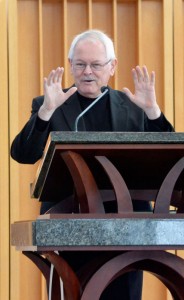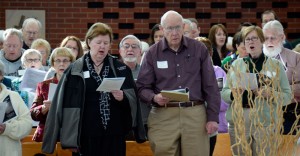By Barb Arland-Fye
The Catholic Messenger
Fr. Ron Rolheiser explores faith

HIAWATHA, Iowa — Just before falling asleep one night you reflect about the day, contentedly, and recognize God’s hand in everything that happened. On another night you stare holes in the dark and wonder, “am I an atheist?” Does that mean on one night you had strong faith and on the other night you didn’t? No, on one night you had a strong imagination. On the other night you had a weak imagination, Oblate Father Ron Rolheiser told his audience of 600 people at a faith formation conference April 5 in St. Elizabeth Ann Seton Church.
Fr. Rolheiser, a popular columnist, author and theology school president, focused his talk on the dark night of the soul, a time when people struggle with faith and lose sight of God acting in their lives. Believers may experience a dark night at various times in their lives, he said.
The highly sought-after speaker had been scheduled to give a presentation to Iowans two years ago, but had to cancel at the last minute to receive an honor in his native Canada. The Archdiocese of Dubuque and the dioceses of Davenport and Des Moines co-sponsored his visit. The daylong conference titled “Doubt and Dark Nights: A Failure of Faith or a Failure of Imagination?” began with Morning Prayer led by Archbishop Michael Jackels.
An outline of the five main points that Fr. Rolheiser planned to cover posed five questions: What is faith? Why do we need faith? What are dark nights? Why does God give us dark nights? What are some practical principles or guidance for our souls? His talk interspersed Scripture, stories and anecdotes, question and answer sessions.
Mother Teresa’s 60-year struggle to experience God in her life provided a prime example in Fr. Rolheiser’s exploration of faith lived out even in times of spiritual dryness.
As a young woman, Mother Teresa had a fervent faith, but at age 27 and until her death 60 years later at age 87, she experienced a profound absence of God in her life. She remained deeply in her faith, committed to God and the poor she was serving. God enveloped her, but she couldn’t see God, much like an unborn child in the mother’s womb cannot see his or her mother, Fr. Rolheiser said.
Faith is deep under the surface. In John’s Gospel, people walked away from Jesus, thinking he was talking about cannibalism when he preached that those who believe in him must eat his flesh and drink his blood. His 12 apostles, however, did not leave. They had no place else to go, but they also believed Jesus. Peter told Jesus, “We know you have the words of everlasting life.” Those are Peter’s shining words in the Gospel, Fr. Rolheiser says. “Faith is our mystical center; it’s what I have to do.”
Believers long to see God and attempt to define God. But “God is infinite; we are finite. God is so far beyond us that it’s hard to conceptualize,” the theologian says. Believers don’t see God, but the effects of God, much in the same way that people don’t see summer, but rather the effects of summer: the sun shining, the fig tree with its green leaves.
So how do we stop from conceptualizing God? Someone in the audience asked. “Don’t worry about it,” Fr. Rolheiser said. If you have a good imagination, that’s fine, but there will be times when you won’t. God is in control of the switches.
The theologian cited St. John of the Cross, a 16th century mystic, who observed that the more you let God into your life, the less you see of God.

Believers experience a dark night of the soul as a purification of their religious experience, Fr. Rolheiser said. He quoted from Jurgens Moltmann, a 20th century German theologian, who observed this about the Crucified Christ: “… Our faith begins at the point where atheists suppose that it must be at an end. Our faith begins with the bleakness and power which is the night of the cross, abandonment, temptation, and doubt about everything that exists. Our faith must be born where it is abandoned by all tangible reality; it must be born of nothingness, it must taste this nothingness and be given it to taste in a way no philosophy of nihilism can imagine.”
Fr. Rolheiser told his audience to understand dark nights as a normal part of their faith and life’s journey. Through dark nights, a believer’s faith deepens, grows and is purified. Dark nights of the soul are failure within believers’ imagination, not in their faith. The proof of God’s existence is not found at the end of some philosophical or mathematical calculation, but at the end of a life given over to charity and hope, Fr. Rolhesier said. The dark night is the purifier of faith; love and faith begin at that point.
Bob and Ellie Budd of Our Lady of Lourdes Parish in Bettendorf took Fr. Rolheiser’s message to heart.
“God becomes quiet so we can listen to what we are saying and doing in our lives and examine whether we’re being Christians,” Bob said. “If we have a sin, we have to be honest with ourselves. We have to look from within. Sometimes God becomes quiet so we can listen to what we’re putting out.”








